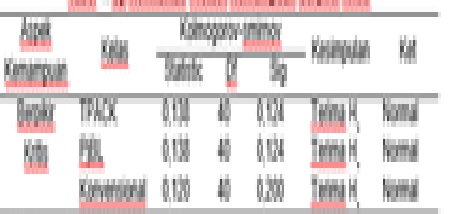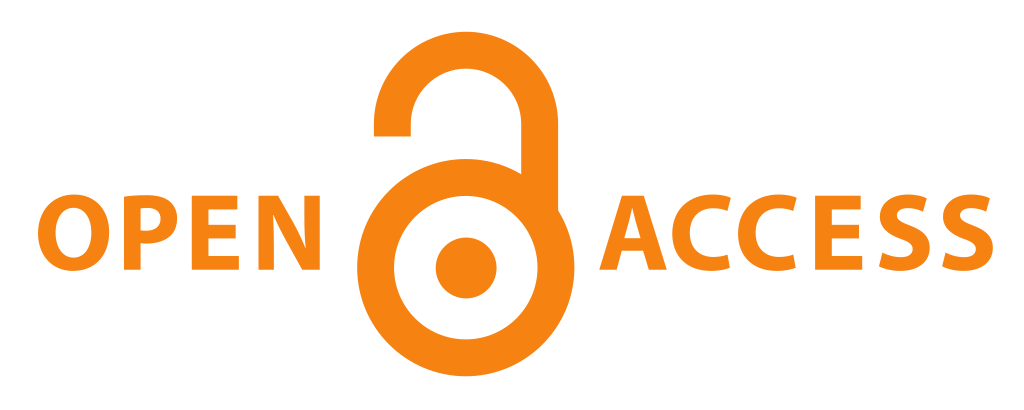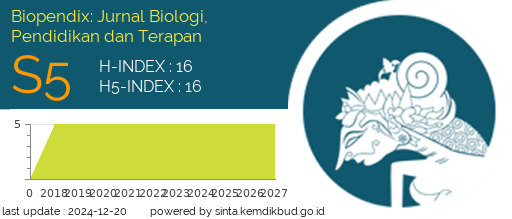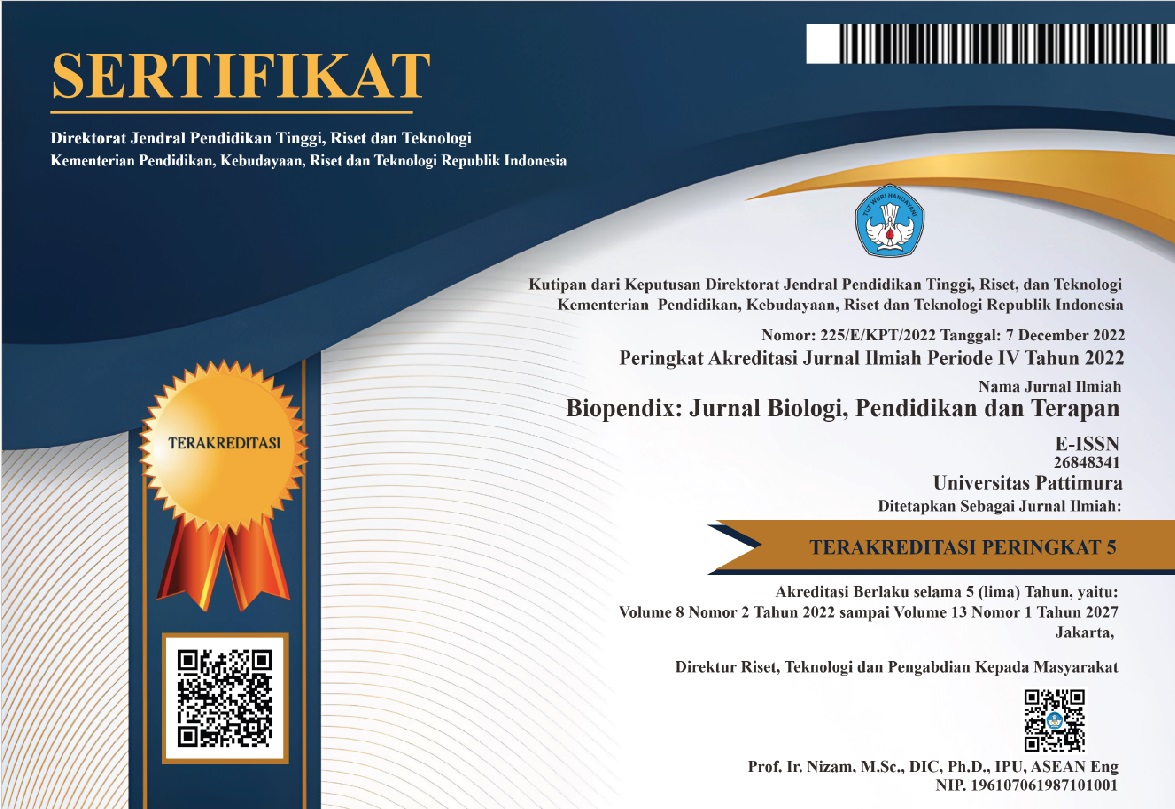PENERAPAN PENDEKATAN TPACK YANG DIINTEGRASIKAN DENGAN MODEL PROJECT BASED LEARNING (PjBL) UNTUK MENINGKATKAN KEMAMPUAN BERPIKIR KRITIS DAN KREATIF MAHASISWA PADA MATA KULIAH PENGEMBANGAN PROFESI GURU
Abstract
Background: This research aims to improve critical and creative thinking skills in teacher professional development courses through the application of the TPACK approach which is integrated with the Project Based Learning (PjBL) model.
Method: This research uses an exploratory research model. Qualitative data was obtained after the pretest, during learning, after the posttest through interviews and questionnaires. Quantitative data was obtained through pretest and posttest data. The research subjects were Biology students at FKIP Pattimura University who offered teacher professional development courses. The research instrument used was a test. Quantitative data analysis uses descriptive statistics and test scores, while qualitative data analysis uses data collection procedures, data reduction, data presentation, and building a conclusion.
Results: The results of calculating the implementation of the TPACK approach integrated with the Project Based Learning (PjBL) model to improve students' critical and creative thinking skills in teacher professional development courses show an average value of 89.90 with a significant value of 0.000, which is smaller than 0. 05 (0.000<0.05) so the hypothesis can be accepted.
Conclusion: The application of the TPACK approach integrated with the Project Based Learning (PjBL) model is very effective in improving the critical and creative thinking skills of prospective biology teacher students.
Keywords: TPACK, PjBL, critical thinking, creative thinking. teacher professional development.
Downloads
References
Anderson, L. W., Krathwohl. (2020). A taxonomy for learning, teaching, and assessing. New York: Addison Wesley Longman, Inc.
Arends, R. I. (2020). Learning to teach. (Terjemahan Helly Prajitno Soejipto & Sri Mulyantini Soetjipto). New York: McGraw Companies, Inc.
Banzi, M. (2020). Getting Started with Arduino Second Edition. O’Reilly
Bambang, S. (2019). Prinsip asesmen dan evaluasi pembelajaran. Edisi ke tiga. UNY: Press.
Belland, B. R. (2021). PjBl. London: Springer International.
Brooks, J.G., & Brooks, M.G., (2020) In Search of Understanding: The Case for Constructivist Classrooms, Alexandria, VA: Association for Supervision and Curriculum Development.
Brookhart, S. M. (2020). How to assess higher-order thinking skills in your classroom. Virginia: ASCD Member Books.
Caine, R.N., & Caine, G., (2020) Making Connections: Teaching and the Human Brain, New York: Addison-Wesley.
Coelho et al., 2021 & Guthrie et al., 2022 Project based teaching in literature Vol 3.
Claudette, T. (2020). Critical Thinking across the Curriculum: Process over Output. Vol.1, 65-72.
Dan, D. & Chris, C., (2020). Creative learning environments in education-Asystematic literature review. Vol.2, no. 8, 80-91.
Giancoli & Hala, W, (2020). Project based teaching in literature classrooms. No. 232, 332-337.
Heong. (2021). The levels of Marzano Higher Order Thinking Skills. Among Thecnical Education Student. Vol.I, no. 2, 21-25.
Johnson, E. B. (2020). Contextual teaching & learning: Menjadikan kegiatan belajar-mengajar mengasyikkan dan bermakna. (Terjemahan Ibnu Setiawan). California: Corwin Press, Inc
Kuhlthau, C., Maniotes, L., & Caspari, A. (2020). PjBL Learning in the 21st Century. London: Libraries Unlimited.
Molenaar, I., Boxtel, C., & Sleegers, P. (2020). PjBL in an innovative learning. Jurnal Education, 785-803.
Owens, R. F., Hester, J. L., & Teale, W. H. (2020). Where do you want to go today Inquiry-based learning and technology integration. The Reading Teacher, 55 (7), 616-625.
Paul, R., & Elder, L. (2020). The nature and funcion of critical & creative thinking.
(2019). Critical thinking: Competency Standars Essential to The Cultivation of Intellectual Skills, Part 4.
(2021). Critical thinking competency standars: Standars, Principles, Performance Indicators, and Outcome with a Critical Thinking Master Rubric.
Richey, R. C., & Klein, J. D., (2021). Design and Development Research. New York: Lawrence Erlbaum Associates, Inc.
Rong, H. (2022). Chinese International Students’Perception of the Project Based Learning Experience. Vol.4, no. 2, 48-57.
Veenman, M. V. J., Van Hout-Wolters, B. H. A. M., & Afflerbach, P. (2023). Project and learning: conceptual and methodological considerations. Creative dan critical Learning, 1(1), 3–14.

Authors who publish with this Journal agree to the following terms:
- Author retain copyright and grant the journal right of first publication with the work simultaneously licensed under a creative commons attribution license that allow others to share the work within an acknowledgement of the work’s authorship and initial publication of this journal.
- Authors are able to enter into separate, additional contractual arrangement for the non-exclusive distribution of the journal’s published version of the work (e.g. acknowledgement of its initial publication in this journal).
- Authors are permitted and encouraged to post their work online (e.g. in institutional repositories or on their websites) prior to and during the submission process, as it can lead to productive exchanges, as well as earlier and greater citation of published works




 2
2






